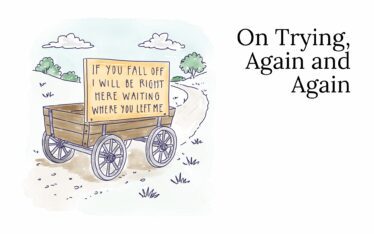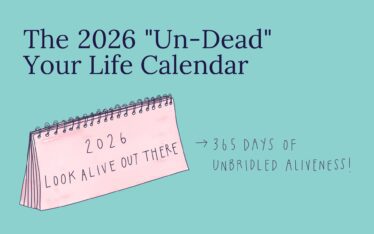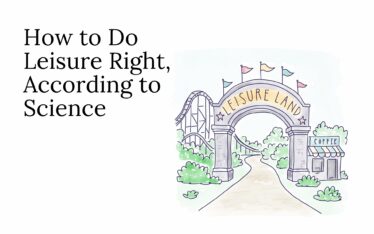“Death is not the biggest fear we have; our biggest fear is taking the risk to be alive—the risk to be alive and express what we really are.” —Miguel Angel Ruiz
I have a tendency to let fear win the tug of war in my life, so much so that I created an Anti Chicken-Shit List (it’s an excel spreadsheet, so it’s super nerdy). I record the things I would do if I wasn’t afraid, and somehow seeing things in writing tends to take the sharp edges off the things I thought I was afraid of.
Marketing my workshops by cold calling groups I’d love to work with, for example—the fear of rejection and failure is palpable. But when I list it, name it, and look at it from multiple sides, the fear doesn’t seem as daunting.
There’s a remarkable difference between playing to win vs. playing not to lose in life.
Playing to win means putting yourself out there, being willing to be vulnerable, being willing to take the risk of failing or looking like a bit of a buffoon because the possibility of winning—reaching that dream—is just so undeniably compelling.
Playing not to lose is about playing it safe, and that’s the Saboteur’s sandbox. Flying under the radar at work, hoping to not get noticed—that’s playing it safe, playing not to win. One of my clients was afraid to put her name in the ring for a city council spot because she wanted to avoid the hurt of not being chosen. She had volunteered around the edges for like 8 years, pining for more of a leadership role, but playing not to win. We can get by doing that kind of thing for a little while and then the light starts to dull in our souls, doesn’t it?
You and your mindsets
Are you familiar with the concept of fixed vs. growth mindset? A fixed mindset causes you to avoid failure at all costs because under this mindset, failure is like this shameful confirmation of your own inabilities which can’t be fixed, so they have to be hidden. Every situation is evaluated: Will I succeed or fail? Will I look smart or dumb? Will I be accepted or rejected? Will I feel like a winner or a loser? Will I make an ass of myself on the volleyball court? Fixed mindsets typically lead to lack of trying and failure . . . failure to launch.
Under a growth mindset—the preferred mindset, in case you couldn’t see the writing on the wall—failure is seen as a steppingstone to success. The fact that you fail at something doesn’t mean that you can’t do it, it means that you can’t do it yet. (Not all of us will make it to the Olympics, but we’ve already managed those expectations.) Growth mindsets are intoxicated with possibility. We can change and grow in extraordinary ways through effort and grit.
To what extent do you believe you can edit your life to be the version you want it to be? To make positive change in the areas that matter to you?
Now what?
So how do we muster up the courage, the strength, the confidence, to overcome fear, and to adopt a play to win, growth mindset?
First we get in touch with what our fears really are, then we dissect them and decide how we want to shape the narratives about them in our head.
Whatever your fears are, it’s always worth it to do the “why does that matter” exercise.
Pick a fear, any fear . . . let’s pick the “worrying about what other people think” doozie.
I worked with a woman recently who felt totally hampered by this one. She didn’t want to leave her job and move to another one that may or may not have as big of a title. The question I asked was, “why does that matter—you being worried what other people will think of you and your new job?” She said that she didn’t want to be judged for maybe not having an award-winning career trajectory.
I asked the question again: “why does that matter?” She said that she didn’t want people to think she wasn’t successful.
Again: “Why does that matter?” She said she didn’t want to look like she wasn’t smart, like she didn’t have the chops to be picked for great jobs.
“Why does that matter?” She said that people might not accept her if she wasn’t smart.
“Why does that matter?” She said if she wasn’t accepted, she’d be even more lonely than she already was.
Wow. Not every succession of the “why does it matter” yields a therapy-like breakthrough, but you’d be amazed how quickly the foundational stuff like “not being good enough” or worrying about “being unloved” emerges.
I suggest you try this with your fears. At the end of the day, why do they really matter, and when seen through the light of that deep, deep response, DOES IT REALLY MATTER?
The client I was telling you about, the one playing not to lose by applying for other jobs . . . when she untangled that she wouldn’t be rejected and home alone on weekends if she took a Director job instead of a VP job, she felt so much more free to explore other options.
What would you do if you weren’t afraid of failing? If you weren’t afraid of what people thought of you?
What would be on your Anti-Chicken Shit List?
When have you overcome fear before—and how did that work? Focusing on what worked is usually a far more productive exercise in these cases, rather than dwelling on what hasn’t worked. When you successfully worked through a fear, how did it feel?
Most of us don’t eradicate the fear—we just lean on the character strength of courage to do the thing that scares us anyway, because we’ve determined that it matters.
What’s the worst thing that can happen to you? Will it kill you? Based on everything you’ve ever read in this blog, I think we can agree that death isn’t the worst thing that can happen to you. The worst thing that can happen to you is allowing yourself to die inside while you’re still alive on the outside.

P.S.: We should totally Instagram it up!
P.P.S.: Oh and just in case you missed it… I’d love you forever if you took 16 minutes out of your life to watch my TEDx talk!






